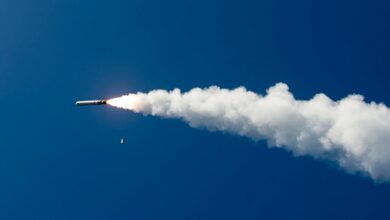
Russia’s unprovoked invasion of Ukraine has raised the harsh reality that our nation’s energy security is a national security issue.
The global energy disruption and subsequent price spikes instigated by the invasion forced many countries – especially in Europe – to recognize they can no longer afford to depend on energy imports from untrustworthy foreign actors, like Russia, to keep economies powered and running.
The situation also underscored that America has an opportunity to be a stabilizing force in the global energy market.
With gas prices falling below $4 this month, consumers are finally seeing some relief. Now the focus of those in Washington must be on establishing policies that can better insulate Americans from detrimental price spikes in the future.
These need to be long-term solutions that will actually support the companies willing to make significant investments in the United States so that we may continue to deliver affordable, reliable energy to the American people and our allies.

Weaponizing Energy
Vladimir Putin has shown the world that energy is not just used to power economies but can also be weaponized against neighbors.
The invasion exposed serious supply vulnerabilities and few countries were able to completely slash ties with Moscow, with some taking half measures such as banning only coal imports and “phasing out” petroleum products.
But the response was understandable. For decades, Russia has built pipelines and supply chains to keep Russian resources flowing to Europe – and even the US.
Europe is a key destination for Russia’s energy exports, accounting for half of their crude oil exports and three-fourths of their natural gas exports. And before President Joe Biden signed his Executive Order banning the import of Russian energy to the United States, last year, we imported nearly 700,000 barrels per day of crude oil and refined petroleum products from Russia.
Investing in US Oil and Gas
Restricting energy supply resulting in energy shortages that contribute to broader social and political unrest is the current threat we face. Therefore, the Biden administration and federal lawmakers must embrace the need for policies that foster greater investment in US oil and gas development.
Signals that we will facilitate investments in US production will help us withstand market volatility in the long-term, but more broadly, be in the interest of our national security.
Unfortunately, this administration has not had the best track record when it comes to bolstering US oil and gas development.
We need to reduce our dependence on oil altogether.
We need to choose long-term energy security over energy and climate vulnerability.
And we can do that by passing my plan to speed the transition to a clean energy future that is made in America with American values.
— President Biden (@POTUS) March 31, 2022
In response to Russia’s actions, earlier this year, Biden said his administration was coordinating with energy producers to advance a “collective investment to secure stability and global energy supplies.” But little has been done to actually leverage our nation’s assets and encourage more production.
In fact, the opposite is true. The recently signed budget reconciliation bill, the Inflation Reduction Act (IRA), is evidence of that pretense. The IRA advanced some of Biden’s highest policy priorities around clean energy investments but failed to take the necessary steps to further support responsible oil and gas development.
Because make no mistake, clean energy investments won’t help fix that $100-plus bill it takes to fill up your gas tank. Especially in the short term.
Unfortunately, this administration has leaned into the false choice between traditional fuels and renewables. As JPMorgan CEO Jamie Dimon recently argued, these are not dichotomous goals. “Why can’t we get it through our thick skulls, that if you want to solve climate [change], it is not against climate [change] for America to boost more oil and gas?”
Becoming Energy Secure
Our opportunity to put more downward pressure on consumer prices will come with investments in production and the infrastructure to move these products to market.
The Dakota Access Pipeline (DAPL) is a prime example of how our country can become energy secure again. The system transports can transport up to 750,000 barrels of oil per day, originating in North Dakota and extending through South Dakota, Iowa, and Illinois.
Since beginning operation in 2017, DAPL has proven to be one of the world’s safest, most efficient pipelines. In fact, it played a key role in allowing the United States to, once again, become a net petroleum exporter in late 2019. The first time we achieved this feat since 1949.
The US needs more pipelines to help get energy to the market, meet our domestic demand, and reduce fuel prices.
Moreover, certain tax proposals gaining some traction among politicians on the left will actually hurt our chances of increasing domestic supplies. Fossil fuel companies need to make large capital investments in development projects and infrastructure.
Calls for policies that increase taxes on the revenues that allow these companies to make investments – like a windfall profits tax – could actually lower domestic production, as it did when we implemented something similar back in 1980.
Reckoning
Putin has forced a reckoning with where and how democracies get their energy. It is crucial that the administration support American energy production by removing the barriers that impede energy production, encouraging investment in pipeline infrastructure, and avoiding policies that eat into revenue needed for new sources of energy development.
President Biden should put the administration’s support behind US energy companies and their workers in order to bring affordable and reliable energy to Americans across the country.
 Major General James ‘Spider’ Marks (retired) is the former Commanding General of the US Army Intelligence Center.
Major General James ‘Spider’ Marks (retired) is the former Commanding General of the US Army Intelligence Center.
As the senior intelligence officer for the 2003 liberation of Iraq, Marks was responsible for creating a complete understanding of Saddam Hussein’s military capacity and his intentions.
Disclaimer: The views and opinions expressed here are those of the author and do not necessarily reflect the editorial position of The Defense Post.
The Defense Post aims to publish a wide range of high-quality opinion and analysis from a diverse array of people – do you want to send us yours? Click here to submit an op-ed.











